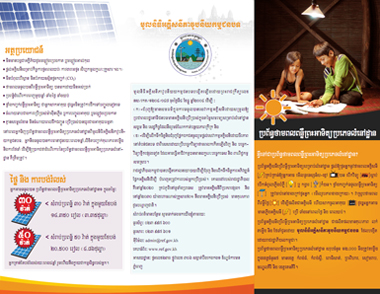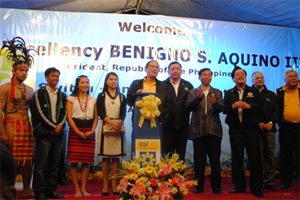| |
 |
| Newsletter of the International Institute for Energy Conservation (IIEC) |
November 2011 |
|
| |
| |
|
IIEC Awarded Major Energy Efficiency Project in the Pacific
 The International Institute for Energy Conservation (IIEC) has been awarded a 3-year multi-million dollar energy efficiency project in the Pacific Islands by the Asian Development Bank. The project covers Cook Islands, Papua New Guinea, Samoa, Tonga and Vanuatu. The International Institute for Energy Conservation (IIEC) has been awarded a 3-year multi-million dollar energy efficiency project in the Pacific Islands by the Asian Development Bank. The project covers Cook Islands, Papua New Guinea, Samoa, Tonga and Vanuatu. |
|
The objective of the Promoting Energy Efficiency in The Pacific: Phase 2 (PEEP2) project is to stimulate energy efficiency through demand-side energy efficiency improvements in the residential, commercial, and government sectors in each of the five countries. The project will focus on reducing energy intensity, thereby enhancing energy security, making energy services more affordable to end-users, and reducing greenhouse gas emissions. |
| To achieve the proposed objective, the IIEC will start by setting up and improving the access to comprehensive information on energy use in each country to aid in decision making and policy development. Thereafter, the IIEC will use the information gathered to establish and support development of energy efficiency practices and programs, and support information dissemination and public awareness on energy efficiency best practices. |
|
|
|
| |
|
| |
|
Bringing Rural Villages Closer to Renewable Energy in Cambodia
 The IIEC is designing, producing and disseminating a series of promotional materials on renewable energy as part of the Renewable Energy Promotion and Awareness Program (REPA) from the Rural Electrification Fund (REF) in Cambodia. The program is funded by a World Bank / Global Environment Facility grant and the Rural Electrification Fund. The IIEC is designing, producing and disseminating a series of promotional materials on renewable energy as part of the Renewable Energy Promotion and Awareness Program (REPA) from the Rural Electrification Fund (REF) in Cambodia. The program is funded by a World Bank / Global Environment Facility grant and the Rural Electrification Fund. |
REF was established by the Royal Government of Cambodia and is responsible for implementation of renewable energy projects in rural areas such as Solar Home Systems, Mini/Micro Hydro and Biomass Gasification. The REFís aim is to ensure the Cambodian rural population have access to affordable electricity in remote areas with no electricity supply.
The IIECís objective under the REPA program is to raise awareness on renewable energy at both rural and national level. The need for promotional and educational resources on renewable energy is paramount to gather interest and support from rural communities and investors. The promotional materials developed by IIEC include TV and radio spots, gimmicks, video presentations, brochures (as shown in the figure on the right in Khmer), |
 |
|
| promotional events in rural villages, website, workshop for promoting investment in micro/mini hydro and biomass gasification projects and many more. |
|
|
|
| |
|
Philippine President Switches-On Energy Efficient Lights
 On August 19, 2011 no less than the President of the Philippines, Benigno Simeon Aquino III, led the official switch-on of new energy efficient park lights in Baguio City, Burnham Park Complex. The city is considered the Summer Capital of the Philippines and the park is one of its most popular tourist destinations. On August 19, 2011 no less than the President of the Philippines, Benigno Simeon Aquino III, led the official switch-on of new energy efficient park lights in Baguio City, Burnham Park Complex. The city is considered the Summer Capital of the Philippines and the park is one of its most popular tourist destinations. |
| The retrofitting of the park lights was implemented under the Public Lighting Component of the Philippine Energy Efficiency Project (PEEP) which is being funded through a combination of a loan and grant from the Asian Development Bank and implemented with the support of the IIEC.† The objective is to demonstrate and promote energy savings through the adoption of efficient lighting technologies for public lighting.† This includes replacement of 160W mercury vapor lamps with 70W high pressure sodium vapor lamps and the replacement of 358W decorative lamps with 15W bollard type compact fluorescent lamps. |
 |
|
| Total energy savings are expected to reach 293.4 MWh per year equivalent to a total monetary savings of P2,934,000 or US$68,200 per year. With a project cost of about P6,400,000 or US$148,800, payback period is estimated to be 2.5 years and emission reduction is estimated at 158.4 tons of carbon dioxide (tCO2) per year. |
| For further information, please contact Angelica Dealino - adealino@iiec.org |
Back to Top  |
|
|
|
| |
|
Setting the Road Map for State Clean Energy Funds in India
 The UK Foreign & Commonwealth Office (UK-FCO) has commissioned the IIEC to design a road map for State Clean Energy Funds for end-use energy efficiency and renewable energy projects. The UK Foreign & Commonwealth Office (UK-FCO) has commissioned the IIEC to design a road map for State Clean Energy Funds for end-use energy efficiency and renewable energy projects. |
|
The objective is to assess options available to the states in India to create clean energy funds using public benefits charge. The IIEC is currently in the process of identifying interested states that can benefit from design of State Clean Energy Fund and the associated implementation model. |
|
IIECís tasks include:
|
| Development of a detailed ďState Clean Energy FundĒ design document that can be used as a discussion paper for any public commenting process. |
| Development of a structure that can potentially be issued by the Regulatory Commissions and/or define a process to include collection of such a fund in the tariff-setting mechanism. |
| Development of a Roadmap for establishment and implementation of a State Clean Energy Fund including narration on regulatory decision-making requirements. |
| Development of a Manual on Establishing State Clean Energy Funds by state governments in India that includes Best Practices examples of PBCs from USA, Europe and Asia. |
| IIEC convened the first Stakeholder Roundtable on August 2011 in Mumbai to discuss the findings. The Stakeholder Roundtable was attended by Chairpersons of three Electricity Regulatory Commissions, representatives of banking/financial institutions, legal experts, UK-FCO programme management team, and IIEC project implementation team. |
| Following discussions, Dr. Nitin Pandit, President of IIEC, summarized and highlighted a number of key points made regarding the Clean Energy fund design, management structure, revenue source, partnerships, operation and application. These will be incorporated in a final report to the UK-FCO. |
| For further information, please contact Nitin Pandit -npandit@iiec.org |
Back to Top 
|
|
|
|
| |
|
About IIEC
 The International Institute for Energy Conservation (IIEC) was established in 1984 as a non-governmental (NGO), not-for-profit organization, in order to foster the implementation of energy efficiency in developing countries and countries in transition. IIECís mission is to accelerate the global adoption of energy efficiency, transport and environmental policies, technologies and best practices to enable sustainable economic and environmental development. The International Institute for Energy Conservation (IIEC) was established in 1984 as a non-governmental (NGO), not-for-profit organization, in order to foster the implementation of energy efficiency in developing countries and countries in transition. IIECís mission is to accelerate the global adoption of energy efficiency, transport and environmental policies, technologies and best practices to enable sustainable economic and environmental development. |
|
For the past 25 years, IIEC has been providing solutions to the problems posed by the rapid increase of energy
demand in developing and industrializing countries. IIEC has an established niche as a provider of novel
solutions with the flexibility to work simultaneously with multilateral institutions, governments, academic and
research institutes, industry and non-governmental organizations. |
|
|
 If you do not wish to receive IIEC E-Notes, please reply to e-notes@iiec.org with the word "UNSUBSCRIBE" in the subject line. If you do not wish to receive IIEC E-Notes, please reply to e-notes@iiec.org with the word "UNSUBSCRIBE" in the subject line. |
| |
 |
Partners for Sustainable Energy and Environmental Solutions |
|
|
 |
| Head Office : |
 |
Asia Regional Office : |
Country Offices : |
|
USA
Tel: +1 703 281 7263
Fax: +1 703 938 5153
e-mail: iiecdc@iiec.org |
Thailand
Tel: +66 2 662 3460-4
Fax: +66 2 261 8615
e-mail: iiecbangkok@iiec.org |
India
Tel: +91 20 6410 2557-58
e-mail: iiecindia@iiec.org |
Philippines
Tel: +632 426 8567/426 6001 loc 4833
Fax: +632 426 8566
e-mail: iiecmanila@iiec.org |
|
 |
| Copyright © 2011 International Institute for Energy Conservation, All Rights Reserved. |
|
